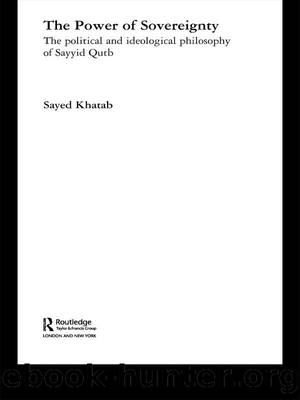The Power of Sovereignty (Routledge Studies in Political Islam) by Sayed Khatab

Author:Sayed Khatab [Khatab, Sayed]
Language: eng
Format: epub
Publisher: Taylor and Francis
Published: 2006-02-14T08:00:00+00:00
SOCIALISM
This section examines Qutbâs perception of differences between the Islamic system and Socialism. It will briefly examine sociopolitical particularities of socialist society and compare these with the Islamic law laid down in the Shariâah. It will investigate the origins and mechanism of Socialism and socialist views on Capitalism, Democracy and religion. The concept of Arab Socialism and its genesis will be discussed, together with the ideological response of Muslim scholars.
Socialism is an ideology that seeks to correct and rectify the moral and social problems that were inflicted by Capitalism. Socialism is not a precise term, there being several versions of it. Utopias were conceived of by the ancient Greek philosophers and thinkers such as Plato (427â347 BC).211 Later the Persian socialist Mazdak expressed another form of Socialism, which dominated Persian politics in the late fifth and early sixth centuries before Islam. Mazdak advocated a social programme that abrogated, among other things, private property and marriage. According to al-Shahrastani (d. 548/479) âMazdak proclaimed a community of women, and made wealth and women freely and equally available to all men like fire, water and fodder.â212 In 528, Crown Prince Chosroes launched a campaign to eliminate the Mazdakites. Among those who were killed was Mazdak.213
In nineteenth-century Europe, there were the utopias of Robert Owen (1771â1858) of Great Britain and Charles Fourier and Comte de Saint-Simon of France.214 There are also Fabian, syndicalist, guild, Marxist, market, democratic, Arab Socialism and others.215 The definition of Socialism, which became known in England in the 1830s, increased, within less than a century later, to more than 260 definitions.216
The details and mutual differences of all of these variants of Socialism require a separate study. What should be noted here is that, according to Qutb, the common characteristics among most, if not all of them, is the basic principle of separating religion from state. Religion has no role in the sociopolitical and economic affairs of society.217 Socialism, as asserted by al-Badri (1983), holds the view that âreligion is the opiate of the massesâ.218 According to Lichtheim (1978) âSocialism is generally associated with secularismâ.219 To Qutb, âSocialism, in its various forms, has the same secularist worldview as Capitalismâ.220
Socialism offers a social and common critique of the capitalist mode of production and exchange. It argues that free and uncontrolled market economics on which Capitalism rests are bound to bring about an allocation of resources that favour the rich and perpetuates injustices and enormous inequalities of income and wealth.221 Chapra (1995) pointed out the characteristics of Socialism as follows:
Download
This site does not store any files on its server. We only index and link to content provided by other sites. Please contact the content providers to delete copyright contents if any and email us, we'll remove relevant links or contents immediately.
| Africa | Americas |
| Arctic & Antarctica | Asia |
| Australia & Oceania | Europe |
| Middle East | Russia |
| United States | World |
| Ancient Civilizations | Military |
| Historical Study & Educational Resources |
Never by Ken Follett(2880)
The Man Who Died Twice by Richard Osman(2299)
Machine Learning at Scale with H2O by Gregory Keys | David Whiting(2291)
Fairy Tale by Stephen King(2070)
Will by Will Smith(2042)
Rationality by Steven Pinker(1765)
The Dawn of Everything: A New History of Humanity by David Graeber & David Wengrow(1571)
The Dark Hours by Michael Connelly(1570)
Principles for Dealing With the Changing World Order: Why Nations Succeed and Fail by Ray Dalio(1373)
Friends, Lovers, and the Big Terrible Thing by Matthew Perry(1328)
A Short History of War by Jeremy Black(1300)
HBR's 10 Must Reads 2022 by Harvard Business Review(1256)
Go Tell the Bees That I Am Gone by Diana Gabaldon(1234)
Can't Hurt Me: Master Your Mind and Defy the Odds - Clean Edition by David Goggins(1227)
515945210 by Unknown(1208)
Fear No Evil by James Patterson(1109)
443319537 by Unknown(1072)
Works by Richard Wright(1018)
Going There by Katie Couric(991)
